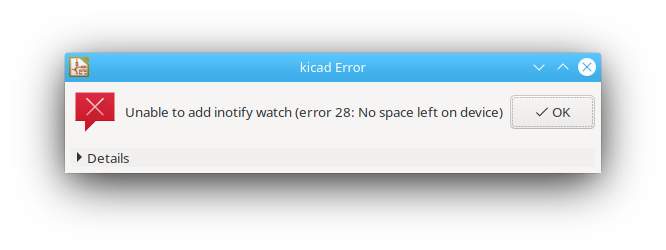Run this to install KiCAD 6.0:
sudo add-apt-repository ppa:kicad/kicad-6.0-releases sudo apt update -y sudo apt -y install kicad
Run this to install KiCAD 6.0:
sudo add-apt-repository ppa:kicad/kicad-6.0-releases sudo apt update -y sudo apt -y install kicad
After you have installed KiCAD from Flatpak using
flatpak install --from https://flathub.org/repo/appstream/org.kicad.KiCad.flatpakref
you can run it using
flatpak run org.kicad.KiCad
You can append any arguments to KiCAD, for example open a project file directly from the command line:
flatpak run org.kicad.KiCad MyProject.pro
When opening KiCAD on Linux, you see the error message Unable to add inotify watch: (error 28: No space left on device):

You need to increase the number of inotify watches that can be active at once:
echo fs.inotify.max_user_watches=65536 | sudo tee -a /etc/sysctl.conf && sudo sysctl -p
and then restart KiCAD
The DO214AC package is more commonly called SMA. In KiCAD you can find it in the Diode_SMD library as D_SMA package
You can download the Connector_PCBEdge library from the KiCad website and use the footprints from there for your PCI express card. You can use one of these footprints:
KiCAD generates a lot of backup-like files, for example MyPCB.sch-bak that should be ignored by git and don’t need to be committed to the repository.
This is the .gitignore file I use to manage my KiCAD projects:
*-bak *-backups *-cache* *-bak* _autosave* \#auto_saved_files\#
Note that TechOverflow’s KiCAD project initialization script automatically generates this.gitignore.
This library provides a schematic symbol for the Arduino MKR zero’s 2.54mm (0.1″) headers. Currently I don’t have the footprint
Download KiCAD schematic library here (ArduinoMKRZero.lib)
This KiCAD library is hereby released into the public domain (CC0 1.0 Universal)
This image shows the Arduino MKR Zero schematic symbol from the library.
This snippet provides a parser and serializer for KiCAD schematic symbol libraries and DCM symbol documentation libraries. It will parse the KiCAD libraries into a number of records, consisting of a list of lines. An extended version of this snippet has been used in my KiCADSamacSysImporter project
__author__ = "Uli Köhler"
__license__ = "CC0 1.0 Universal"
class KiCADDocLibrary(object):
def __init__(self, records=[]):
self.records = records
@staticmethod
def read(file):
# A record is everything between '$CMP ...' line and '$ENDCMP' line
records = []
current_record = None
for line in file:
line = line.strip()
if line.startswith('$CMP '):
current_record = []
# Add line to record if we have any current record
if current_record is not None:
current_record.append(line)
if line.startswith("$ENDCMP"):
if current_record is not None:
records.append(current_record)
current_record = None
return KiCADDocLibrary(records)
def write(self, out):
# Write header
out.write("EESchema-DOCLIB Version 2.0\n")
# Write records
for rec in self.records:
out.write("#\n")
for line in rec:
out.write(line)
out.write("\n")
# Write footer
out.write("#\n#End Doc Library\n")
class KiCADSchematicSymbolLibrary(object):
def __init__(self, records=[]):
self.records = records
@staticmethod
def read(file):
# A record is everything between 'DEF ...' line and 'ENDDEF' line
records = []
current_record = None
current_comment_lines = [] #
for line in file:
line = line.strip()
if line.startswith("#encoding"):
continue # Ignore - we always use #encoding utf-8
# Comment line processing
if line.startswith("#"):
current_comment_lines.append(line)
# Start of record
if line.startswith('DEF '):
current_record = current_comment_lines
current_comment_lines = []
# Add line to record if we have any current record
if current_record is not None:
current_record.append(line)
if line.startswith("ENDDEF"):
if current_record is not None:
records.append(current_record)
current_record = None
# Clear comment lines
# We can only do this now to avoid clearing them before
# they are used in the DEF clause
if not line.startswith("#"):
current_comment_lines = []
return KiCADSchematicSymbolLibrary(records)
def write(self, out):
# Write header
out.write("EESchema-LIBRARY Version 2.4\n#encoding utf-8\n")
# Write records
for rec in self.records:
for line in rec:
out.write(line)
out.write("\n")
# Write footer
out.write("#\n#End Library\n")
Inside the directory where you want to create the project, run
wget -qO- https://techoverflow.net/scripts/kicad-init.sh | bash /dev/stdin MyProject
You should replace MyProject (at the end of the command) with your project name.
Note: This will initialize an empty KiCAD project without any libraries. This is equivalent to creating a new project in KiCAD itself (using the GUI).
Note: We recommend to use our new script to initialize a project with project-specific footprint and symbol libraries, see How to initialize your KiCAD project on the command line. The script on this page initializes an empty project without any libraries.
Inside the directory where you want to create the project, run
wget -qO- https://techoverflow.net/scripts/kicad-initialize.sh | bash /dev/stdin MyProject
You should replace MyProject (at the end of the command) with your project name.
Note: This will initialize an empty KiCAD project without any libraries. This is equivalent to creating a new project in KiCAD itself (using the GUI).